CHURCH 02 - Old Testament Leadership: Levites
Ex 32:25-29 Levites chosen by God and their zeal
Different translations: ”today you have ordained yourselves for the service of the LORD” … “today ordain yourselves for the service of the LORD” … “today you have been ordained for the service of the LORD”
- Levites are chosen by God in response to their whole-heated obedience and zeal in the matter of the golden calf, adhering to God above family relations.
Exo 38:21 Levites involved with making of tabernacle
“These are the records of the tabernacle, the tabernacle of the covenant, which were drawn up at the commandment of Moses, the work of the Levites being under the direction of Ithamar son of the high priest Aaron.”
- Levites’ work, service and role in the making of the tabernacle are recorded here.
- Levites work under the leadership of the priests, here Ithamar, the fourth son of Aaron.
Lev 25:33 Jubilee: Levites can get sold houses back
“Such property as may be redeemed from the Levites – houses sold in a city belonging to them – shall be released in the jubilee; because the houses in the cities of the Levites are their possession among the people of Israel. 34 But the open land around their cities may not be sold; for that is their possession for all time.”
- Levites are allowed to sell houses but not pasture lands. They are entitled to redeem sold houses with no time limit (unlike for non-Levites: one year Lev 25:30). In the year of Jubilee, the houses are returned to them automatically.
- They are not allotted major land, a different inheritance requires special protection.
Num 1:45-54 Levites not enrolled for war
“So the whole number of the Israelites, by their ancestral house, from twenty years old and upward, everyone able to go to war in Israel – 46 their whole number was six hundred three thousand five hundred fifty. 47 The Levites, however, were not numbered by their ancestral tribe along with them.”
- Here: Levites are not numbered by their ancestral tribes as this pertains to military enrollment from 20 years upward.
- In Num 3 there will be a census of Levites, not for war but rather for work purposes.
- Levites don’t go to war. Why? Are they doing spiritual warfare? Are they defenders, not attackers? Is Israel to believe God can save them in war even though they don’t ‘draw every man’ away from spiritual functions? Is this a faith thing like Gideon’s 300 soldiers? The giving of first fruit in faith?
Num 3:5-9 Duties of the Levites
“Then the LORD spoke to Moses… 6 Bring the tribe of Levi near, and set them before Aaron the priest, so that they may assist him. 7 The shall perform duties for him and for the whole congregation in front of the tent of meeting, doing service at the tabernacle; 8 they shall be in charge of all the furnishings of the tent of meeting, and attend to the duties for the Israelites as they do service at the tabernacle.9 You shall give the Levites to Aaron and his descendants; they are unreservedly given to him from among the Israelites. 10 But you shall make a register of Aaron and his descendants; it is they who shall attend to the priesthood, and any outsider who comes near shall be put to death.”
- Responsibility: to help, assist, minister to high priest and priests. Task of serving, keeping guard, protecting and attending to the tabernacle. In charge of furnishings.
- David will make them gatekeepers later, in line with this.
- Levites help with the management of jobs around sacrifices, keeping of procedures.
- First time there seems to be hierarchy (if this is one), Levites are given to the priest.
- The hope is for them to know and value their role: ‘We serve but we are not slaves’.
- In Num 16:1-10 discontent of Korah breaks out over this issue: Korah is a Levite, but seeks priestly function as well. He rises is rebellion. Moses, Aaron intercede. God punishes, then gives a confirmation of his choosing of Aaron as high priest (Num 16:41-50) and the tribe of Levi (Num 17).
- Levites are to assist, serve, contribute, help. A division of labor is instituted here.
- Num 3:8 Attend to the duties for the Israelites as they do service at the tabernacle. Again the taking of the tribe of Levi as a substitute for the firstborn (Exo 32:29, Num 3:41).
Num 2:1-34, 2:17 Israel & the Levites Camping Order

- Central to the entire camp was the presence of God, symbolized by the tabernacle.
- The tabernacle’s opening was towards East. The Israelites approached from East
- In the inner circle, opposite the tabernacle entrance, as guardians, the priestly families camped.
- In the inner circle also camped the three kindred of the Levites: the Merarites to the North, the Gershonites to the West, the Kohathites to the South.
- Around them the 12 tribes of Israel camped, grouped in three, with one tribe having leadership function for the camp.
- Levites camped centrally, matching their role. Dignity, privilege and duty go together
Num 2:1-34, 2:17 Israel & the Levites’ Marching Order
Israel marched in the following order:
- Priests with ark
- Camp Judah
- Gershonites & Merarites with tabernacle & court
- Camp Reuben
- Kohathites with tabernacle furnishings
- Camp Ephraim
- Camp Dan
Priests & Levites have places of honor and importance in the middle

Num 3:21-26 Gershonites carrying tabernacle, screen, court
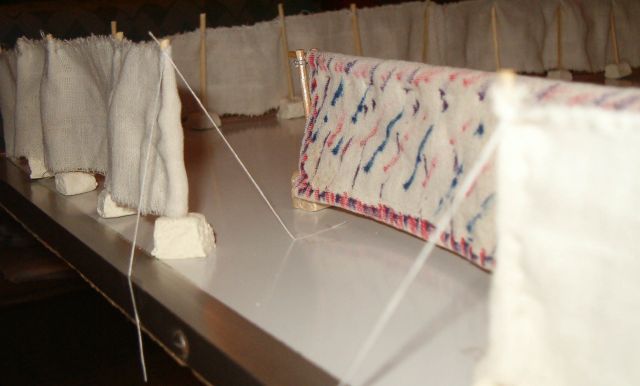
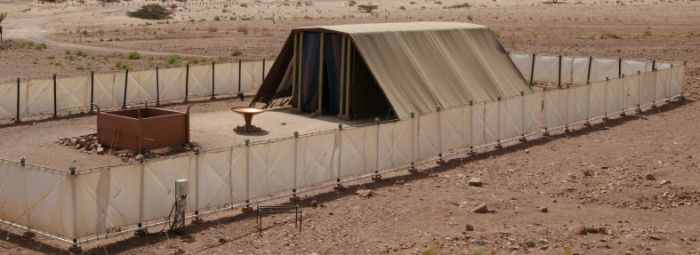
- Tabernacle, curtains, coverings, screen of court, court hanging, cords
Num 3:27-32 Kohathites carrying ark, tabernacle furnishings, screen
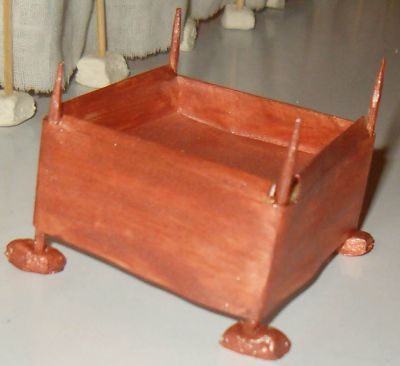
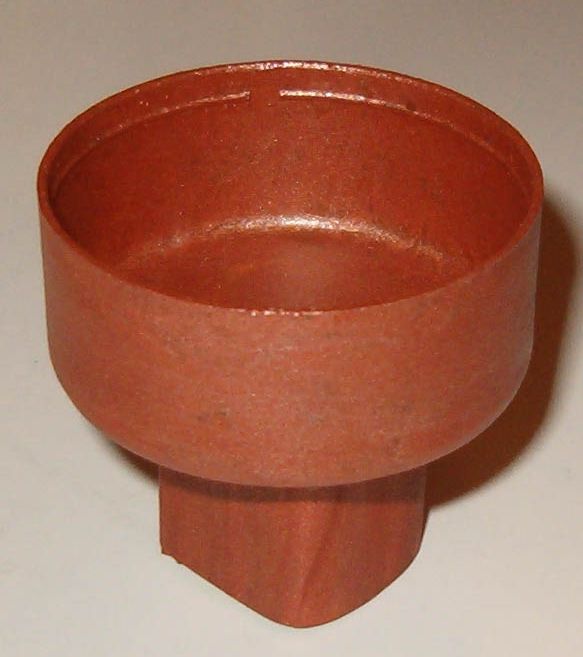
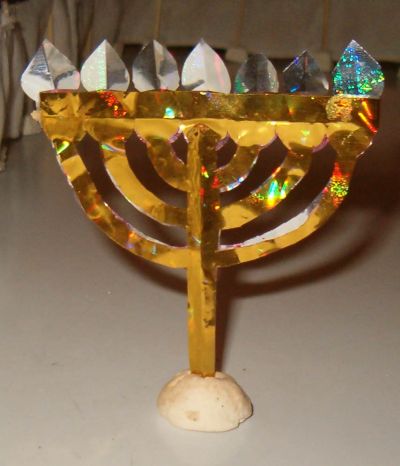
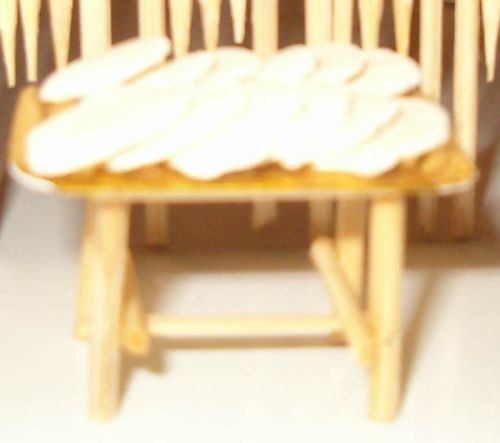

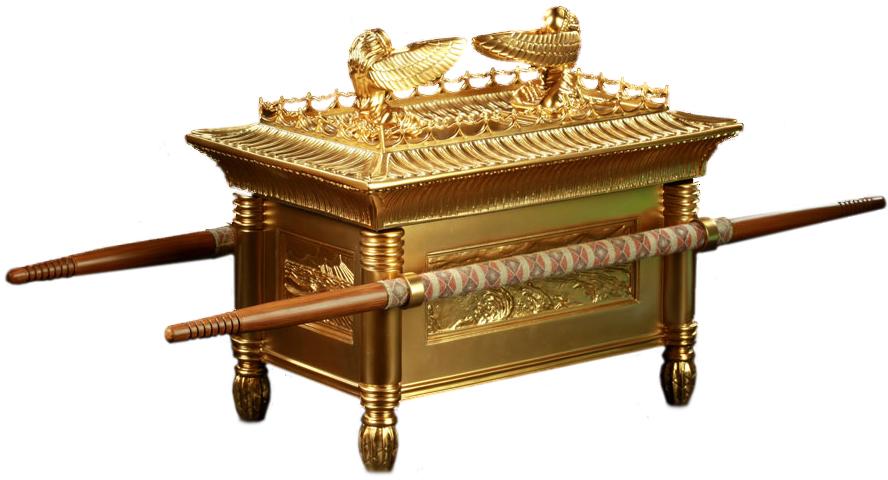
- Ark, table, lamp stand, incense & burnt offering altar, screen of tabernacle
Num 3:33-37 Merarites, carrying frames, pillars, bases
“Merarites … six thousand two hundred … Zuriel as head … North of the tabernacle … 36 The responsibility assigned to the sons of Merari was to be the frames of the tabernacle, the bars the pillars, the bases, and all their accessories, – all the service pertaining to these; 17 also the pillars of the court all around, with their bases and pegs and cords.”
- Tabernacle frames, bars, pillars, bases. Court pillars, bases, pegs, cords.


Num 4:1-20 Kohathites carry the ark packed up by priests Leader: Eleazar
- Age of those making the census: 30-50 years old. Is this therefore the normal working time for a Levite? Num 8:23-26 indicates 25 years.
- Aaron and Moses are Kohathite. They are handling the most holy things. They have to treat things with great reverence, not looking on them, not touching them except by poles, priests doing the packing up by covering them backwards.
- All this expresses great respect and fear of God. As Kohathite with this important duty one may be tempted to pride, but carelessness or presumption would be deadly.
Num 4:21-28 Gershonites carry the tabernacle, screen, court Leader: Priest Ithamar
Num 4:29-33 Merarites > frames, pillars, bases Leader: Priest Ithamar
Num 7:1-9 Offerings of the leaders > wagons for the Levites
- Gershonites > 2 wagons with 4 oxen tabernacle, screen, court
- Merarites > 4 wagons with 4 oxen tabernacle frames, pillars bases
- Kohathites > no wagons, carried by men ark, the furnishings of the temple
- Clearly distributed duties and responsibilities. The resources are according to function, need and duty of each group.
- Moses is given wagons, doesn’t keep them, passes them on to others as per designation. God distributes. Power or position is not an issue here, rather function.
- Challenge to do what God called one to do, to be satisfied with one’s responsibility and with the division of responsibilities, to take what God gives, according to calling. One’s contentment or discontentment is often reflected in one’s children’s attitude.
- Holy things had to be carried. Does this mean Kohathites had to carry all their stuff? Were other wagons allowed for personal things?
- Whichever way: to transport the tabernacle items meant a reduction in the amount of things that Levites can own and take with them. God seems to limit the amount of possessions of the Church domain!
Num 8:5-13 Levites Ordained, are an Elevation Offering
- Levites are an elevation offering. Only here at the first ordination? Or repeatedly?
- Separating out Levites for God’s service. They are given as substitute for each family’s firstborn, whom God claims ever since he claimed Egypt’s firstborn in judgment (Exo 13:13-16). All shall lay hands on them.
- First cleansed by sprinkling purification water, then full body shave, then first sin offering, then burnt offering, a elaborate procedure of cleansing and setting apart.
- Whole congregation, Levites upfront, 10 whole congregation will lay hands on them, all involved, participate, all have a role, not leaders’ decisions behind closed doors.
- This ceremony is very different from people officiating in idolatrous practices.
Num 8:14-19 Levites are God’s as replacement of Israel’s firstborn
- God claims Levites as his own, unreservedly given from among the Israelites as substitute for the firstborn, both human and animals. Levites are given to priests.
- Num 8:19 so that there may be no plague. Harks back to Egypt: God judging by claiming the firstborn. If priests are not sacrificing, if Levites are not assisting, the people will come carelessly close, resulting in a plague. God puts the weight on spiritual leadership. This will becomes a problem in Korah’s rebellion (Num 16).
Num 8:23-26 Levites – 25 to 50 years service
- Levites 25 years onward they shall begin to do duty in the service of the tent of meeting
- The Num 4 census was from 30 years on. Was there a 5 years apprenticeship?
- At age 50 years they will retire. They may keep assisting, putting them into the role of teaching young priests, passing down understanding, handing over responsibilities.
- A high priest remained so for life. Retirement here is from tabernacle duties, not in general: Levites and priests had families, flocks, herds and pasture lands to look after.
- Ages: 12 years old for coming of age, 20 years old for soldiers, 25 years old for Levitical duty, 30 years old for priestly duty
Num 16 The Levite Korah’s rebellion to get the priesthood
- Korah (a Levite), Dathan and Abiram (Reubenites) and 250 others express discontent.
- What is the complaint? All are holy, why do Moses and Aaron exalt themselves? Moses hasn’t fulfilled his promise, the promised land is out of reach.
- Korah and his group use censers to offer incense, basically usurping priestly functions. They motivated by envy and jealousy.
- Num 16:7 Moses: “you Levites have gone too far!” (referring to Korah and others)
- Num 16:10 Moses: you seek the priesthood as well (this is what the conflict is really about).
- Num 16:13 Complaint of Moses lording it over the people, of not fulfilling what he said.
- Num 16:15 Moses: ‘I have not taken one donkey from them.’ This is a testimony of integrity of Moses’ leadership. Similar to Samuel later (1 Sa 12:1-5) and Daniel (Da 6:4).
- They are after position, role, respect, authority. But they don’t understand the sovereignty of God’s choice. Neither do they understand the holiness of God, the duty of representation priesthood means, the depth of care and fear of God this requires. They bring a privilege to the position that is not there. They are not asking for a responsibility, but for a position.
- What is the problematic attitude? Discontentment, no gratefulness, no appreciation, competition, jealousy. They already having an honorable role (Korah is Levite), yet asking for more. Bangladeshi proverb: ‘If you give them food, they want to sit down. If you let them sit down, they want to lay down.’ This is pride, like Satan.
- Maybe Reubenites are part of this rebellion because Reuben was Jacob’s firstborn. Maybe the Reubenites resent the Levites being chosen as sustitute for the firstborn.
- The complaint is also inconsistent: They complain about not getting fields and vineyards, but Levites and priests (the function they try to usurp) will not be given fields or land anyway. Moses is not lording it over them, he is not making up laws favoring himself, for Moses’ tribe will not get any land by this system. God doesn’t think one higher than the other, Levites than priesthood, Levites than normal people
- God doesn’t judge at once, he gives them opportunity till tomorrow to calm down, to think again, to repent. They do not repent but rather are busy rousing rabble.
- They see miracles, amazing immediate intervention of God but they don’t believe.
- Num 16:47-48 Aaron making atonement in the middle of the plague, between dead and living. What a strong and crystal clear picture of Aaron being the true priest!
- Actually, incense doesn’t make atonement. But maybe since the issue was incense (censers are mentioned in Num 16:6, 6:17, …) that’s how God chooses to speak.
- Num 16:28 Moses states that he is sent by God, the law he announced is from God, not him
- The effect of this horrible story is that all will fear God more, also Levites and priests
- The irony is that Korah and his group want to be God’s representatives, but they don’t understand God at all, they don’t understand what God wants, nor how he works.
- In contrast: Moses and Aaron understand God, fear when there is reason for fear, intercede when they know God is angry. They love and care for the people in spite of the offense. They keep representing the people as mediators, intercessors, true priests.
- They say: all are holy, why a mediator? Is a mediator needed? Yes, God wants a priesthood, a mediator, a intercessor. All these are also pictures of Jesus.
Num 18:1-7 Priesthood as gift to Aaron’s family, Levites as gift to priests
- Num 18:1 Levites must bear the responsibility for offenses against the sanctuary
- Num 18:1 Aaron and sons must bear the responsibility for offenses connected with the priesthood.
- Those who lead, those who are given responsibility are held more responsible than a worshiper coming and making a ceremonial mistake.
- Each is responsible for his work, his field of action, duty, authority, not for what he can’t influence, but for what he can.
- Num 18:2 Levites serve priests in their functions, not as personal servants or house helps.
- Num 18:2-3 Levites given as help to priests. Levites guard, attend to, take care of, manage
all things around tabernacle and altar but can’t touch the utensils. Otherwise Levites and priest will die. Distinction in role; priests manage Levites, Levites manage the people. Know your responsibility and your limits. Not everything can be delegated. - Stay with your job, within your function, be content with that for all roles are equally important. No need for comparison, competition or power games.
- Num 18:6 Levites are given to priests, but also to God. This means accountability for the priests behavior. Work attitude should be working ‘as unto God’, not for men. Similarly Paul tells slaves to work ‘as for the Lord, nor for your masters’ (Col 3:23).
- Num 18:7 Priesthood, tabernacle and altar service is God’s gift to the Aaron family; a privilege, an honor, though involves a lot of work, rituals and rules. Also command to perform their duties at the altar and behind the curtain with the right attitude: diligently, wholeheartedly, willingly, thankfully, realizing the privilege, the duty, the awesomeness of the call.
Num 18:21-32 Provision for the Levites
- The tenth of Israel’s produce goes to the Levites, since they have no big land allotment, only Levitical cities and pasture lands. How did they divide it? No detail.
- They are a 13th of the population (one of 13 tribes), but get a 10th of the produce of the land > there should be enough. But that depends on people obeying.
- Command to give to God a tithe of the best of what is received (100th of people’s tithe). 28 says it is given ‘to the priest Aaron’. Probably this is given to the high priest or (more likely) distributed to the priesthood.
- To give a tithe is to give to God himself, though it benefits humans. Trust God with your giving. Accountability is needed, but also mental release, as it is no longer yours
- Tithe is given by the person from what they got, not cut automatically from salary (!).
- Those living off others’ tithe must themselves tithe, so as to identify with the givers, to stay humble, to understand the sacrifice involved, to not foster poverty mentality (I have something to give!).
- Warning in Num 18:32: Death for those who profane the holy gifts. Those receiving tithe must have a sense of awe and the fear of God on them. Value what is given and the trust it represents. Do not get angry when it stops (no sense of entitlement). Do not play games with the tithe.
- 32 By not giving the tithe one profanes all one received.
- Who did the priests tithe to? No detail given.
- By this system God links the income of the people to the income of the spiritual leaders. If people are doing well, Levites will do well. If people suffer, so will the Levites. There is no command for spiritual leadership to be poor (or rich), onto be similar to the church members. This link is healthy since leadership needs to understand the situation of the people in order to represent the people.
- Tithes are to maintain ‘the firstborn’, the Levites. But where do finances for things like ‘building funds’ come from? > From special offerings, not from tithes. See Exo 25:1-9, 1 Chr 29:3, 2 Kin 22:4.
- How to apply this today? Is it priest = pastor? But then Levites = what?
- We say: tithe to pastor, but priests didn’t receive tithes. We say: tithe to local church, but the Old Testament temple was a central system. We say: tithe to church, but tithe was also used for the poor and for feasts (De 12:11-12, 14:28-29)!
- It really is not that simple. Also there is no New Testament instruction of tithe to local church as a system, though generosity is definitely commanded and practiced. For details see ECO 20 “Tithes”
Deu 10:8-9, Jos 18:7 Levites blessing Israel, God is their portion
“the LORD set apart the tribe of Levi to carry the ark … to stand before the LORD to minister and to bless in his name. 9 Therefore Levi has no allotment or inheritance with his kindred; the LORD is his inheritance” … 7 “The Levites have no portion among you, for the priesthood of the LORD is their heritage.”
- New: The Levites are to bless in God’s name.
- God is their inheritance & portion. And the Levites are God’s portion or possession.
Deu 12:8-12 Tithes, sacrifices, offerings > feast with family and Levites
- Command to take the tithes, donations, votive gifts to the tabernacle and rejoice before the Lord, together with family, slaves, Levites; a command to include & feast!
Deu 14:22-29 Tithes in normal years and Tithe years
- Command to take the tithes and firstlings to the tabernacle and eat it!
- It seems the tithe is hear made into offerings (Burnt? Fellowship?) which are then eaten with the family. Also command to not neglect the Levites in Deu 14:27.
- This is the stunning generosity of God :-). Is this the festival of Pentecost (harvest)?
- Deu 14:28 Every third year, full tithe goes to Levites, aliens, orphan, widows, … store it in your towns, villages, cities. So did it not go to them every year? In Deu 26:12 this is called the ‘year of tithe’. So what are we to conclude? Maybe:
- Year 1, 2, 4, 5 > to Jerusalem, good feast, rest to Levitical system (central? Villages
- Year 3, 6 > store in village > Levites, aliens, widows, orphans
- Year 7 > sabbatical year
- Was that the way it was meant to work? The instructions are not really that clear, now the distribution worked is simply unmentioned. What seems clear is that it was a very generous and not very legalisticly handled system!
Deu 16:9-14 Festival of Weeks > feast in Jerusalem with everybody
- During the festival of Weeks (or Pentecost or Harvest thanksgiving):
- Deu 16:10 bring freewill offering in proportion to the blessing received and Deu 16:11 rejoice before the LORD, family and slaves and Levites and strangers and widows and orphans in Jerusalem
Deu 18:1-8 Levites may joining the tabernacle system if they want
- Deu 18:6 If a Levite comes from his town to Jerusalem, he has a right to be fed there.
Deu 26:11-13 feast with Levites, third year tithe to Levite, alien, widow, orphan
- Deu 26:10-11 take first fruit to tabernacle, celebrate God’s bounty with Levites & strangers
- Deu 26:12-13 3rd year arrangement: a direct giving to Levites, strangers, widows, orphans in the towns? But why then is the oath ‘before the LORD’? Is this Jerusalem?
Deu 31:9-10, 31:25-26 Levites store law of Moses besides the ark
- Priests and Levites are both given a solemn role to ensure a ceremony: They were to store a copy of the Law of Moses beside the ark, bring it out every 7 years and read it to the entire population.
- Deu 31:25-26 The Law is made a witness against them, to surely fulfill this obligation of reading, teaching and upholding the law.
Jdg 17-18 A Levite turning idolatrous priest for Danites
- This shows the Levitical leadership at a very low point (during Judges), a very quick deterioration after Moses: All characters in this story (Micah, his mother, the Levite, the Danites) act continually contrary to God’s law.
- The story is a wake-up call to Israelites, spiritual and political leaders. And in the end the total shocker: This disastrous Levite turns out to be the grand-son of Moses (Jdg 18:30)!
Jdg 19-21 A Levite causing near genocide of Benjaminites
- Again this shows the Levitical leadership at a very low point (during Judges), a very quick deterioration after Moses: The mentioned Levite is right in demanding justice for the rape of his concubine, but his melodrama and vindictiveness makes Israel descend into a civil war.
- Maybe he is so dramatic because of his own bad conscience: He behaved in such that the concubine had reason to leave him, then he sacrifices her to the mob.
2 Chr 20:14 Prophet Jahaziel, a Levite, assuring King Jehoshaphat
- A Levite being called by God to deliver a prophetic word at a very crucial time for Israel. He is one of few prophets that is heeded by the current King (here: Jehoshaphat).